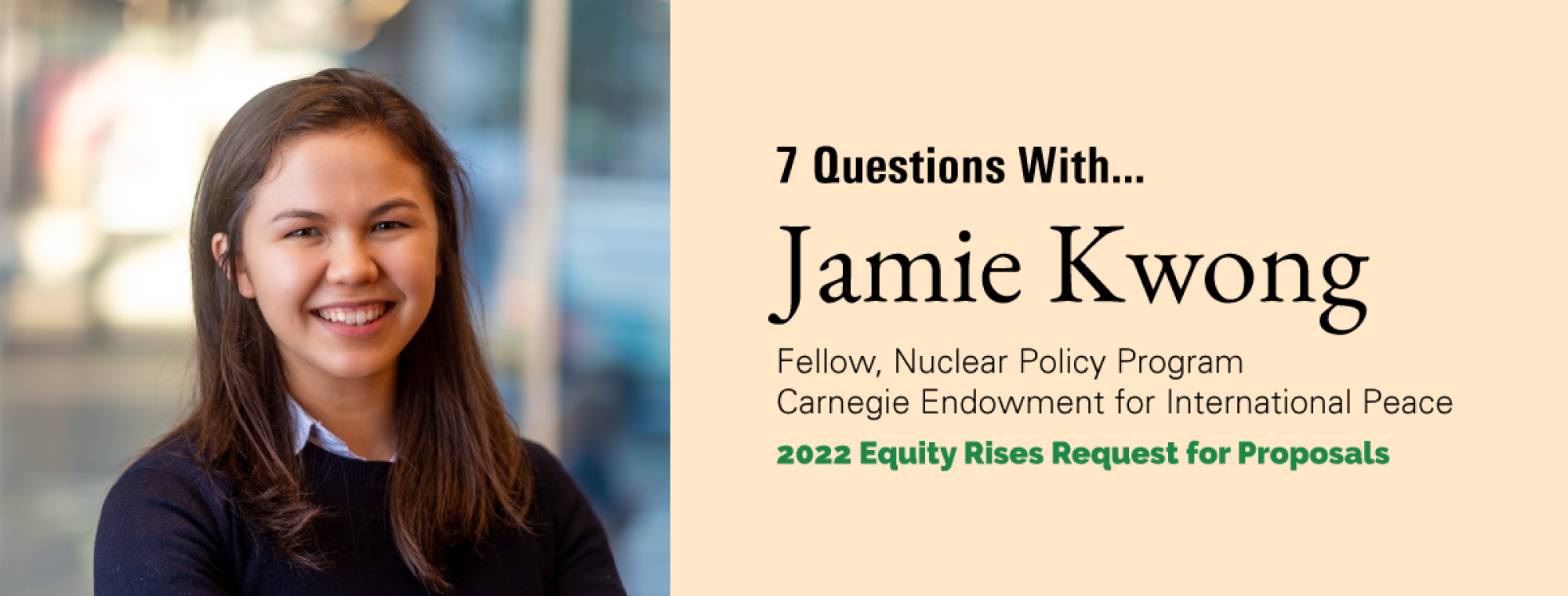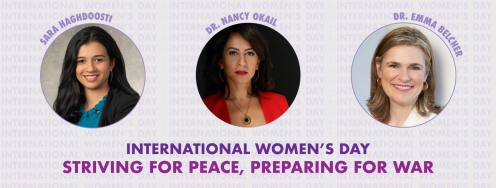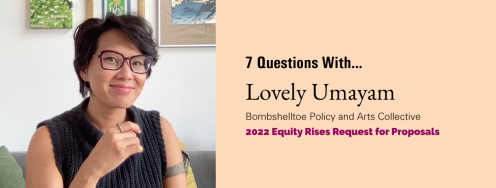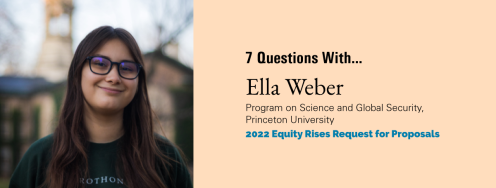Jamie Kwong is a fellow in the Nuclear Policy Program at the Carnegie Endowment for International Peace. She is also a doctoral candidate in war studies at King’s College London. Her research focuses on public opinion of nuclear weapons issues, with her dissertation focused specifically on examining U.S. public opinion of North Korea’s nuclear weapons program. This is part of a series of interviews in which you can get to know the grants given under the 2022 Equity Rises Request for Proposals and the people behind all the work.
Question 1: Tell us about your work! What kind of goals do you have? What are you excited about?
I'm working on a project aimed at examining the threats climate change pose to U.S. nuclear weapons. It aims to evaluate the sustainability of fundamental U.S. nuclear practices in a rapidly changing physical environment and will consider how the failure to adapt those practices to the realities of climate change could exacerbate nuclear risks and lead to catastrophic consequences. My goal is to raise awareness of the issue in an effort to better prepare for the dangerous convergence of nuclear weapons and climate change.
Interviews and conversations with nuclear and climate experts, policymakers, and impacted communities are a central component of my research. I’ve really appreciated the insight gained through these discussions thus far and look forward to continuing to speak with more stakeholders as the project progresses.
Question 2: How did you get involved in the nuclear policy field? What inspired or motivated you to pursue this line of work?
In short, a really good teacher—or, rather, teachers. While at university, I took a summer course on nuclear weapons that brought me to Washington, D.C. for the first time. My professor, Dr. Wayne Glass, designed the course to make D.C. our classroom. He facilitated engagement with leading experts across the nuclear policy field—from policymakers in the White House and Pentagon to decisionmakers on Capitol Hill, from think tankers and academic researchers to those working in various industry positions. These nuclear experts all became our teachers, offering us a “taste” of the field and introducing us to numerous issues, debates, and perspectives. Dr. Glass and our D.C. teachers inspired me to enter the field myself, to contribute what I can to addressing some of the most challenging and complex security issues we face.
Question 3: How do you think including more diverse voices will affect the nuclear policy field?
Including more diverse voices will help cultivate a collaborative environment that stimulates constructive debate and forward-looking research. Diverse perspectives foster the empathy and understanding needed to think innovatively about intractable security issues. Only by integrating this empathy into our work can we effectively diagnose and develop solutions to the most pressing problems. Diversity, equity, and inclusion are therefore central to advancing nuclear policymaking.
Efforts by the Ploughshares Fund to uplift diverse voices through its Equity Rises initiative make me hopeful that we are actively progressing towards these goals. While much work still remains to make long-term and sustainable advancements, I know that our continued commitment to DEI will make our field discernibly better.
Question 4: What's the most interesting or memorable project you've gotten involved with in your career?
While pursuing my PhD at King’s College London, I worked with Dr. Heather Williams on a project aimed at identifying challenges and opportunities for the P5 Process in the lead up to the 10th Review Conference of the Nuclear Non-Proliferation Treaty (NPT). I helped organize and facilitate Track 1.5 and Track 2 workshops that culminated in a civil society event at the 2020 P5 Process Meeting of Principals in London.
The project helped me see firsthand the importance of civil society and government engagement—and the impact that engagement can have on nuclear policymaking. This collaborative work not only promotes and advances transparency in the nuclear field but also provides opportunities to leverage distinct types of expertise to develop both ambitious and pragmatic policy solutions.
Question 5: What’s the one thing about the nuclear policy field you wish people knew or would talk about more often?
My motivation for pursuing the climate-nuclear project is to bring more attention to the intersection of the two issue areas. Important efforts have been made to examine the likely disastrous environmental consequences of a nuclear detonation and to explore the implications of turning to nuclear energy as a potential way to combat climate change. Less attention, however, has focused on the ways in which climate change could affect the maintenance and operation of nuclear arsenals.
I hope this project stimulates greater awareness and understanding of this intersection and helps to promote dialogue and action among key stakeholders to ensure U.S. nuclear practices and procedures adapt to the realities of climate change.
Question 6: What advice do you have for someone trying to enter the nuclear policy and security field?
Find good mentors—and think beyond the traditional notion of who that could be. Mentors come in a variety of forms—a professor, a colleague, a peer—and each has a unique experience and perspective to offer. Be open to learning from all those you interact with, and don’t be afraid to reach out to those you have a genuine interest in learning from.
Relatedly, remember that there is no single or “correct” path to establishing a career in nuclear policy. Folks have different motivations, interests, and backgrounds that drive them to this space and, as such, they all have an important contribution to make to the field. You do too!
Question 7: What is the best book you’ve read recently?
I like to read a lot of historical fiction outside of work. My latest favorite is The Dictionary of Lost Words by Pip Williams. It follows an inquisitive, thoughtful girl who grows up in the office of the editors of the Oxford English Dictionary. While developing a love for lexicography, she quickly learns that not all words make the cut. The novel tells her beautiful story as she strives to preserve the voice of women.
7 questions with Jamie Kwong @jamiekwong




